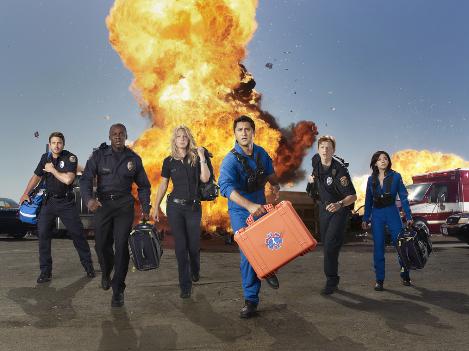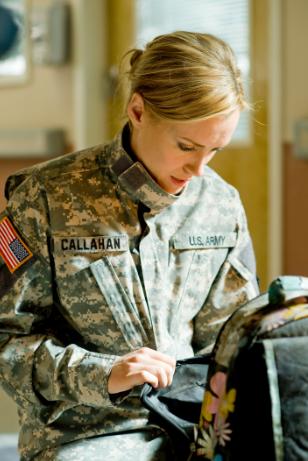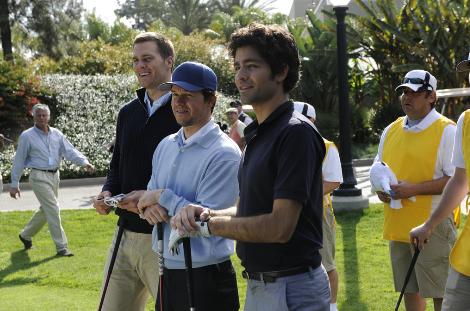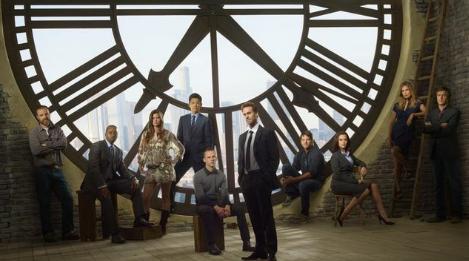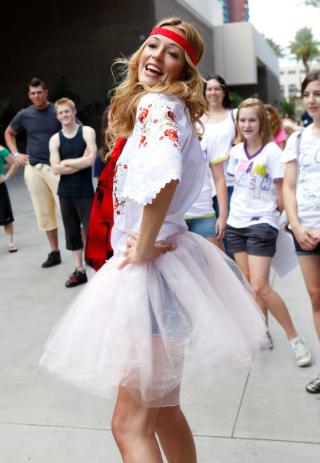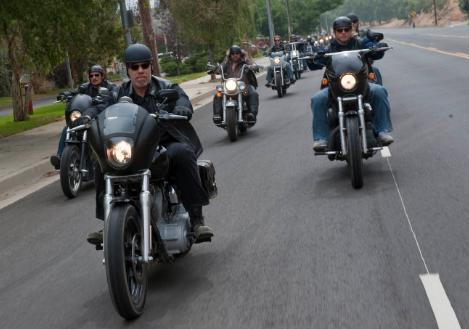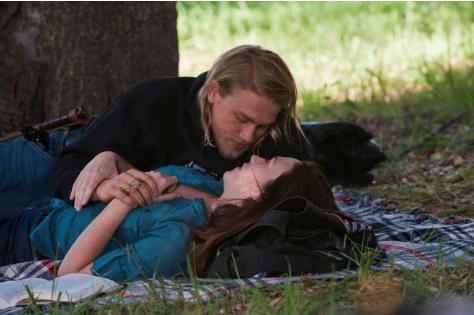The Wife:
Because Sal is one of my favorite characters, his storyline in “Wee Small Hours” stood out the most to me, and seemed almost like a separate, isolated event when compared to Betty’s continued flirtation with Henry Francis and Don’s late-night rendezvous with Miss Farrell and Connie Hilton, all of which seemed last week to be building toward a massive fallout — a bomb which indeed dropped all over Draperville with this week’s installment, “The Color Blue.”
Do you remember how happy we all were just a few episodes ago when Sal was promoted to Sterling-Cooper’s commercial director and finally able to feel somewhat secure with himself in this changing world — a world where knowing the opening sequence of a popular musical beat-by-beat might not be so horrible? Well, all of those dreams for a potentially gay future have come crashing down . . . all because Sal wouldn’t fuck Lee Garner, Jr. in the editing room. Sal’s rejection of Lee’s admittedly rape-y advances earned a late-night call to Harry Crane to can Sal, which lead to a big mess for Don that could only be cleaned up with the very thing Lee Garner, Jr. had asked for: the removal of Sal from Sterling-Cooper.

But I'm married!
The idea of Garner attempting to take advantage of Sal was revolting enough, but the abuse of power was even more so. Can’t a gay man on the down low catch a break on this show? All I can say is that I hope Mad Men jumps forward in time enough to see Stonewall happen, because I desperately want Sal to be able to be Sal (and free Kitty from the chains of her beard-dom). Worse, even, than Garner’s abuse of power was Don’s hate-fueled firing of Sal. When Sal was called in to explain the situation, he tried to do so as delicately as possible without making himself or Mr. Garner look bad. But in Don’s eyes, Lee Garner, Jr. isn’t queer; Sal, however, is. And Don knows it because he’s seen it. He creates a vision of Sal as a lecher, implying that something more must have occurred than what Sal told him. My stomach churns when I hear Don spout, “You people” at Sal, reinforcing the cultural norm of homosexuality as a dirty, marginal position.
And so Don pushes Sal out onto those margins, booting him and his turtlenecks from Sterling-Cooper, after which Sal makes himself into exactly the kind of gay man Don thought he was as he calls Kitty from a payphone in Central Park to tell her he would be home late, just before he sets out to troll for some strange. As a person who has taken exactly one class in gay literature, let me tell you something about anonymous park sex: it never ends well. I fear for Sal. I really do.
Don, meanwhile, is incredibly restless. Connie Hilton has him on retainer for ideas at any given hour, and Don is already having trouble sleeping. He goes on an early-morning drive and spies Miss Farrell, Bowdoin Grad, jogging along the road. After a fateful conversation in the car about MLK and the changing face of the world, he drops her home, but goes out looking for her again another morning. Eventually, Don finds his way to Miss Farrell’s bed, fulfilling the expectations we’ve had for him ever since he watched her dance around the Maypole and he touched the earth upon which she trod.
Don’s work for Hilton provides a nice cover to the night he spends in Miss Farrell’s over-the-garage apartment, making love to a woman who, unlike his wife, is loud in bed and likes to be on top from time to time. Unfortunately, one of their lovemaking sessions is interrupted by Miss Farrell’s brother. She wants Don to meet him, but Don would much rather slip out the back unnoticed. Part of the fun of an affair, after all, is that no one knows. And Miss Farrell’s brother can easily see how uncomfortable Don is with the situation. It’s obvious to him that guys like Don prefer to keep a public face and a private face, but Miss Farrell insists Don isn’t like that at all.
It’s clear then that even though she thinks he knows him, she only knows him about as well as Betty does. Don has a secret drawer in his desk at home where he’s been squirreling away all of his cash bonuses, as well as all evidence of his former life as Dick Whitman. And its an unfortunate accident that Don’s carelessness — interrupted by Eugene’s cries as he stashed his latest bonus away — made him leave his secret keys in his bathrobe, which Betty later found tumbling around in the dryer on laundry day. As I think any curious person would do, she opened the drawer and found the money and a box of items belonging to a man she absolutely doesn’t know. Photos. Dog tags. Divorce certificates. Deeds. Each item dissolving her image of Don further and further into nothingness. Her first instinct seems to be fear, instructing Carla to take the children out of the house as though she had just discovered Don was a serial killer and her family had to be protected during the confrontation. But when Don didn’t return and instead returned to the arms of his lover, her fear and confusion turned to rage, which she tried to mask when Don called her from work the next morning, donning one of his stash of fresh white shirts and instructing her to be ready to be the perfect accessory for his arm at the Sterling-Cooper anniversary party that evening.

We don't like you very much either, Don.
I don’t know how this show has done it, but I really don’t like Don very much anymore. Suddenly, I hate him as much as Betty does. I, too, would be nearly unable to move in that icy sheath, preparing to put on a face to meet the faces that I’d meet, had I found out my husband was not at all the man I thought I knew. The image of Don and Betty as that couple on top the wedding cake is not simply beginning to show cracks in its foundation, but has completely fallen down. Though they sit together at the anniversary party, there is nothing about them that seems whole or connected, and there’s a part of you that wishes Betty hadn’t given up on her affair with Henry Francis because then, in some way, she and Don would be a bit more level.
Meanwhile, at Sterling-Cooper, Paul and Peggy are competing for jobs. Kinsey is angry that Don doesn’t like his writerly idea to sell Aquanet, fearing that with each “And then” the ladies at home will misunderstand. Peggy distills Paul’s idea into its essence, a pithy version of his narrative made for the short attention span of a television viewer. And Kinsey, ever jealous, hates her for this. The two work late, but separately, on Western Union, Peggy speaking off-the-cuff into her Dictaphone while Paul gets soused and distracted from work by jacking off to the Maidenform ad. (I’d like to add here that the version of the Maidenform ad he pulls from his desk is the Dyna Moe rendering. She’s the awesome lady who helped you all MadMenYourself prior to this season.) Unable to concentrate, Paul strikes up a conversation with Achilles the janitor and happens upon the best idea of his career . . . only he gets too drunk, falls asleep and fails to write it down, losing the idea forever because the “faintest ink is better than the fondest memory.”
Before their meeting with Don, Peggy sympathizes with Paul’s plight and encourages him to tell Don what happened. When indeed he does, Don isn’t upset. He understands what it’s like to lose an idea. And it’s here that Peggy spins her magic. She remembers the Chinese saying and posits that a telegram is something you can save, unlike a phone call, which is so temporal that it disappears from existence the minute it’s finished. Paul is stunned at her quick wit, and realizes that she really is this good and her gender hasn’t unfairly endeared her to Don as he previously supposed. Don likes the idea, too, and urges the two to keep working on it.
All this in the midst of a massive change at Sterling-Cooper: the Brits are putting the 40-year-old ad agency up for sale, which means Lane Pryce might get to give his shrewish wife her wish to return to London. Maybe Betty can go with them. She can get a real nanny and a pram there.
Stray thoughts:
- Why is Don being such a dick these days? He’s so mean to everyone at Sterling-Cooper that it’s become a point of mirth in my house.
- “There is no deadline. Give me work as you think of it. I need more ideas to reject.” — Don
- “America is wherever you look, wherever we’re going to be.” — Hilton
- “Your work is good, but when I say I want the moon, I’ll get the moon.” — Hilton
- Don has had an awful lot of fateful conversations with people in cars: the grifters who rob him, Miss Farrell, her epileptic brother . . . it feels very Kerouac.
- “There was nothing and then there was it and then there was nothing again.” — Kinsey providing us with one of Mad Men’s most existential lines
- I really, really, really enjoy Roger’s mom. Truly.
- I feel like these two lines from the people cheating on Betty bear some weight on her situation:
“The truth is that some people may see things differently, but they don’t really want to.” — Don
“People are ignorant. They’re scared of things they don’t understand.” — Miss Farrell

